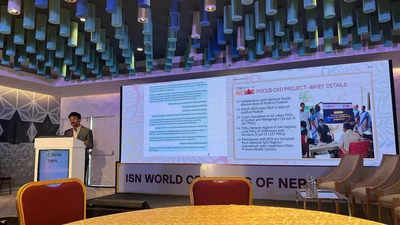Vijayawada: Nephrologists and healthcare professionals from across the world were impressed by the results produced by an artificial intelligence (AI) -based kidney disease screening model developed by Indian nephrologist. Top medical professionals, including from the World Health Organisation (WHO) who attended the World Congress of Nephrology (WCN) in New Delhi, found HelloKidney.ai as a promising solution to address the increasing burden of kidney ailments across the globe.
Dr Chinta Ramakrishna, a noted nephrologist from Guntur in Andhra Pradesh, presented his research at the WCN. This is the first time India is hosting the global event, which brought together around 8,000 kidney specialists and researchers from 180 countries across the globe to discuss and share the latest advancements in kidney disease research. In his presentation, Dr Ramakrishna said Andhra Pradesh is facing a challenging situation with rising incidence of kidney disease.
“Many of the cases are not linked to diabetes and hypertension, but to other external reasons, and what is alarming is it is affecting younger individuals. HelloKidney.ai has been developed as an innovative digital AI solution aimed at significantly improving the lives of patients in the community. With support from the National Health Mission and AP health dept, we conducted a pilot project by deploying our digital AI tool in rural and urban primary healthcare centres. The initiative focused on early detection and treatment of chronic kidney disease (CKD) to prevent kidney failure. The platform proved effective in detecting and delivering standard care to hundreds of kidney patients, who otherwise faced the risk of kidney failure,” he said.
Dr Ramakrishna further stated that about 4 million people in AP are living with undiagnosed CKD. The pilot project indicated that 60% of patients with diabetes have kidney disease, with 26% of them at advanced stages. “HelloKidney.ai project was done for four months in rural PHCs at Uddhanam and A Konduru, and urban PHCs of Guntur and Mangalagiri in 2024. We screened about 2,070 participants identified from the National NCD registry — 845 patients from urban and 1,225 from rural areas — by using the AI tool, which, when integrated with point of care testing, takes less than 10 minutes to identify CKD,” he added.
After analysing the results, it was found that a staggering 98.6% of patients were unaware that they had CKD. The AI tool not only detected but also suggested treatment to patients in PHCs, said Dr Ramakrishna, who presented his project details along with kidney researchers Adeera Levin from Canada and Thomas Blackman from Britain.









